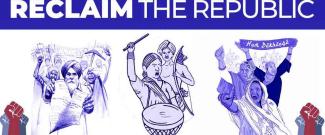Three years since the deadly outbreak of the Covid-19 global pandemic, the world is yet to emerge from its disruptive aftermath. Incidentally, more than anywhere else it is China, where the pandemic originated, which continues to experience aftershocks of the viral outbreak and even witnessed widespread social protests against the coercive state interventions in the name of controlling the pandemic. In the rest of the world even as Covid19 recedes into the background, large sections of people continue to reel under the economic decline, especially the massive job losses and wage cuts triggered by the pandemic. And the economic shock has been compounded as Europe witnesses a major war following Russia’s shocking invasion of Ukraine.
Ten months into the war, there is still no end in sight. We are seeing a revival of the old Cold War environment of big power rivalry, and the world once again being brought to the brink of nuclear showdown. Amidst prolonged economic crisis and decline, politics in Europe has taken a major rightward shift with an alarming rapid rise of neo-fascist forces in several countries. In Latin America, however, rightwing regimes have been voted out in a series of recent elections, the most notable being the defeat of the authoritarian Bolsonaro regime in Brazil.
In Asia, nearer home, a powerful people’s upsurge dethroned the Rajapaksa regime in Sri Lanka while Iran continues to witness a courageous women-led resistance following the murder of Mahsa Amini by the country’s so-called ‘morality police’ for alleged violation of dress code. The powerful protests by Iranian women have since grown into a protracted popular movement defying the repression unleashed by Iran’s theocratic regime. Pakistan has once again landed into political instability after the ouster of the Imran Khan government presumably, among other factors, because of the displeasure of the Pakistan military top brass with Imran Khan’s anti-US rhetoric.
In India, 2022 has been a year of deepening economic crisis and escalating fascist offensive. The government has brazenly reneged on the promise made to the agitating farmers before the Punjab, UP and Uttarakhand elections about ensuring the right to MSP. After denying labour rights in the name of rationalisation of labour laws and making a mockery of social security of workers and employees through the fraudulent new pension scheme, the government has dealt a body blow to the concept of job security by turning Army jobs into four-year contracts for seventy-five percent of young people joining the armed forces. And there is now a growing buzz for replication of this Agniveer model across the board for large-scale replacement of permanent jobs with temporary contracts.
Even as the common people are hit hard by rising prices, disappearing jobs and falling income, the government is determined to banish these burning issues from the public discourse. The Sangh brigade’s Karnataka laboratory produced the hijab ban to sharpen the Islamophobic campaign of communal polarisation. The plight of the Kashmiri pandits was turned into another potent weapon of highly toxic and emotive communal mobilisation with the officially orchestrated propaganda blitzkrieg around the film Kashmir Files. Emboldened by the Supreme Court mandated construction of Ram Mandir in place of the demolished Babri Masjid, a demolition condemned by the court in the same judgement as an egregious violation of the constitutional framework of rule of law, the BJP is now openly challenging the 1991 Act which put an embargo on conflict over places of religious worship by treating their character on 15 August 1947 as being inviolable and final.
Complementing the government’s attempt at silencing dissent, India’s richest corporate house has now acquired the prominent TV channel which used to defy the ‘godi media’ routine and highlight the burning issues facing the Indian people. The mainstream media has thus now been more or less completely turned into a lapdog media complicit in the regime’s mass disinformation and distraction campaign. Ravish Kumar, India’s most influential Hindi television journalist who used to focus on the core issues of livelihood and liberty to take on the fascist propaganda campaign of hate and lies, has thus been forced to bid goodbye to the mainstream television medium. In spite of this overwhelming atmosphere of fear and enforced silence, the voices of the people still ring out even in the electoral arena, as we saw most recently in the Himachal elections, and the judiciary continues to occasionally snub the executive and stall its bulldozer, as seen in the bail granted to Anand Teltumbde and the comments made during the hearing on the appointment of the Election Commission. The government is now desperate to control the judiciary right through the process of judicial appointment and the Union Law Minister even criticised the Supreme Court on the floor of Parliament for taking up bail petitions and public interest litigations.
The battle lines could not be drawn more clearly. As India gets ready for the 73rd anniversary of the foundation of the Indian republic, the people of India will have to summon all their strength and courage to reclaim the republic in the spirit of the constitutional proclamation of liberty, equality, fraternity and justice. Freedom from colonialism had given us the Constitution as the gateway to a modern democratic India, we now need to save it by winning a second battle of freedom – freedom from fascism.











